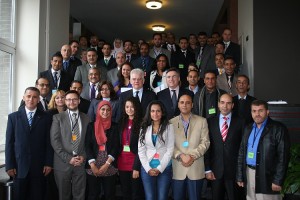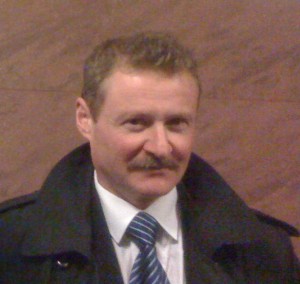By Nigel Ash

Warsaw, 20 October:
A group of Libyan officials and legislators has been in Warsaw, Poland on a five-day course in . . .[restrict]joined-up government.
The 18 bureaucrats and three legislators were told by their Polish hosts that, especially in a time of transition, it was imperative all officials look beyond the narrow concerns of their individual departments to the wider national interest.They needed to appreciate that no unit of government worked in isolation.
Piotr Ciecwierz, of the Department of Economic Affairs at the Polish Foreign Ministry, who organised the “Strategic Economic Needs and Security Exercise” (SENSE) course, told Libya Herald: “This training has shown the participants how their decisions can influence what happens in the whole country.”
Ciecwierz explained that there had been a one-day introductory briefing for the Libyans, along with a similar group of 26 officials from Egypt, attending the course at the National School of Public Administration (KSAP). In this, they were introduced to the computer model of a fictional country named ”Acrona”.

The Programme was created for unstable states, in which political, economic and social changes are still in progress, towards democracy and a market economy. In running the government machine, participants are challenged to formulate policy to deal with a range of financial, health and security issues on arising in both the government and private sectors.
The key to success in the exercise, said Ciecwierz was to make group decisions, from which the results would only show after some time: ”When they started on the simulation, everyone was acting locally, looking to the interests of their own part of the government.” The result was that far from being dealt with effectively, issues became more difficult and more pressing.
”However by the end of the course, people were thinking globally. They had seen on the computer model, the wider and sometimes negative impact that their decisions were having, on the country as a whole.”
KSAP described Acrona as a highly realistic simulation in which, for instance, spending ministries have to make properly-costed budget applications to the finance ministry, which in its turn had to ensure that the funds were spent productively and ministries were achieving their goals. ” If you do not acquire the broader picture of what is happening and appreciate all the priorities, not simply your own, you really can crash the country.” said Ciecwierz.
For instance the ”multiplier effect” of a single decision is often overlooked.
If, for example, money is taken out of the defence budget, this can undermine security, which will have an impact on the health service, as hospitals deal with the injured. It will also generate economic disruption, which in turn undermines business confidence, and therefore discourages foreign investment and tourism. This in its own turn, produces an opportunity cost in jobs that are not created, in an economy where employment is a pressing issue.
The SENSE course was designed primarily for high-ranking government officers, who have already had first-hand experience of the challenges. Nevertheless Ciecwierz said that he believed middle-ranking civil servants were also benefiting from the insights into the tough choices they would face later in their careers. It was likely that Poland would be running a further SENSE programme for Libyan civil servants early next year.
The course ended last night with a formal Polish government reception which was attended by the Libyan chargé d’affaires in Warsaw, Bashir Abudher
[/restrict]








